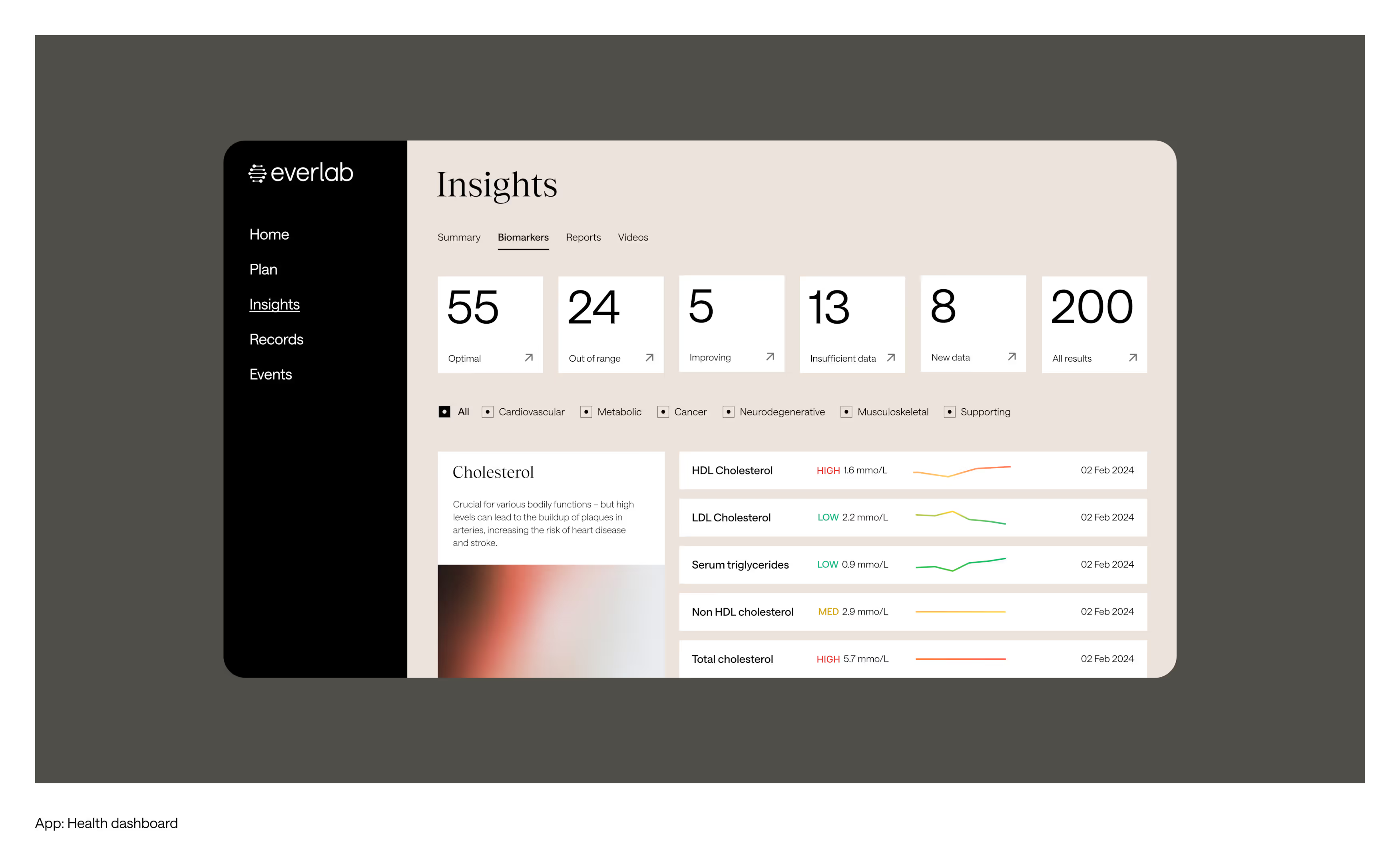What is the CA-125 (Cancer antigen) test & why does it matter?
CA-125 is a biomarker and a blood protein that can play a critical role in assessing your risk for certain conditions, including ovarian cancer.

When it comes to early detection and proactive healthcare, understanding the biomarkers in your body can make all the difference. One such biomarker is CA-125, a blood protein that can play a critical role in assessing your risk for certain conditions, including ovarian cancer. The CA-125 blood test measures the level of the CA-125 protein (found in most ovarian cancer cells) in your blood. The test is straightforward and requires no special preparations. But what exactly the cancer antigen test, how is it performed, and why should it matter to you if you’re focused on living your healthiest, longest life? Let’s dive in.
CA125 is a type of tumour marker that is often elevated in people with ovarian cancer. This test plays a crucial role in diagnosing ovarian cancer, monitoring treatment, and detecting recurrence. However, it’s essential to note that not all ovarian cancers produce CA125. Elevated levels of CA125 can also be caused by other conditions, such as endometriosis, pelvic inflammatory disease, and even normal menstrual cycles. Therefore, while the cancer antigen test is a valuable tool, it should be used in conjunction with other diagnostic methods to provide a comprehensive view of one’s health.
Elevated CA-125 levels (one of several tumour markers) are particularly associated with epithelial ovarian cancer, where it is used to monitor treatment effectiveness and recurrence. While it’s not exclusively tied to cancer it’s a valuable tool for monitoring health risks, particularly in women over 40.
For those with a family history of ovarian cancer or specific genetic markers (such as BRCA1/BRCA2), CA-125 testing can provide crucial insights. But beyond cancer screening, CA-125 contributes to the bigger picture of longevity by allowing for early detection and intervention.
The process begins with a simple blood draw, usually from a vein in your arm. This blood sample is then sent to a laboratory for analysis. The lab measures the level of CA125 in the blood, typically reported in units per millilitre (U/mL). A high level of CA125 may indicate the presence of ovarian cancer or other conditions. Therefore, interpreting the results should always be done by a healthcare professional within the context of your overall health and medical history.
Ovarian cancer is a serious condition that affects the ovaries, the female reproductive organs responsible for producing eggs. Often referred to as a “silent killer,” ovarian cancer can be challenging to detect in its early stages due to its subtle symptoms. This is where the CA-125 test comes into play.
While the CA-125 test is not a screening test for ovarian cancer, it serves as a crucial diagnostic tool. Doctors typically order this blood test before starting ovarian cancer treatment to establish a baseline level of CA-125. Throughout the treatment process, the CA-125 test helps monitor the effectiveness of the therapy and detect any changes in the protein levels, providing valuable insights into the patient’s response to treatment.
Early detection is key to improving outcomes in ovarian cancer treatment. By identifying elevated CA-125 levels, healthcare providers can diagnose ovarian cancer earlier, when it is more treatable. This proactive approach aligns with a longevity-focused lifestyle, emphasising the importance of early intervention and continuous health monitoring.

In the quest to live not just longer, but better, it’s all about catching issues early. Ovarian cancer rarely shows symptoms in its early stages. Not all ovarian cancers cause elevated CA-125 levels, and it is important to discuss test results with your doctor. The CA-125 test can help identify potential red flags before symptoms arise, giving you the best chance to act proactively.
Early detection aligns with a longevity-focused lifestyle, where preventative care and regular health assessments are prioritised. At Everlab, we go beyond simple tests like CA-125 to offer a comprehensive health check-up, helping you manage risks across the five major chronic conditions:
By integrating CA-125 results with over 100+ other biomarkers, Everlab gives you a full, personalised picture of your health, allowing you to make informed choices that support a longer, healthier life.
The CA125 test is a straightforward blood test that usually takes less than five minutes to perform. When you arrive for the test, a healthcare professional will clean the area on your arm where the blood will be drawn. You may feel a slight pinch or stinging sensation when the needle is inserted, but this discomfort is typically brief. You can eat and drink normally before the test, and no special preparations are needed. After the blood sample is collected, you might experience some mild bruising or swelling at the needle site, but this is generally temporary and should subside quickly. The simplicity and minimal discomfort associated with the CA125 test make it an accessible option for ongoing health monitoring.
Understanding the results of a CA-125 test is essential for making informed health decisions. The levels of CA-125 are measured in units per millilitre (U/mL), with a normal range typically being less than 60 U/mL.
If your CA-125 level is high, it’s a signal for further investigation rather than a definitive diagnosis. Your healthcare provider may recommend additional tests, such as a transvaginal ultrasound or a CT scan, to determine the cause of the elevated CA-125 levels. These imaging tests can provide a clearer picture of what’s happening inside your body and help pinpoint the source of the abnormal protein levels.
Ultimately, while a high CA-125 level can be concerning, it’s just one piece of the diagnostic puzzle. A biopsy remains the only way to confirm a diagnosis of ovarian cancer, ensuring that the appropriate treatment plan can be developed.

Everlab tracks all your blood tests in one place using a personalised dashboard offers a convenient and organised way to monitor your health. The dashboard provides a comprehensive view of your results over time, allowing you to identify trends, track improvements, or spot potential issues early. It simplifies communication with your Everlab provider by making it easy to share and discuss data.
If you have been diagnosed with ovarian cancer, your doctor may use the CA125 test to track the effectiveness of your treatment. A decrease in CA125 levels may indicate that the treatment is working, while an increase in CA125 levels may suggest that the cancer is not responding to treatment. Additionally, the CA125 test can be used to detect the recurrence of ovarian cancer after treatment. It’s essential to note that the CA125 test is not a substitute for other diagnostic tests, such as imaging studies or biopsies. Instead, it should be used in conjunction with these tests to provide a comprehensive view of your treatment progress and overall health. This multi-faceted approach ensures that any changes in your condition are promptly identified and addressed, supporting a proactive and effective cancer treatment strategy.
While the CA-125 test is a valuable tool in the fight against ovarian cancer, it’s not without its limitations and risks. One significant limitation is that elevated CA-125 levels are not specific to ovarian cancer. Other conditions, such as endometriosis, pelvic inflammatory disease, and even normal menstrual cycles, can cause false positives, leading to unnecessary anxiety and further testing.
Additionally, the CA-125 test is not sensitive enough to detect all cases of ovarian cancer. Some individuals with ovarian cancer may have normal CA-125 levels, resulting in false negatives. This limitation underscores the importance of using the CA-125 test in conjunction with other diagnostic tools and not relying on it as a standalone screening test.
The National Cancer Institute advises against using the CA-125 test for routine ovarian cancer screening in women who do not have symptoms or are not at high risk for the disease. For those at high risk, such as women with a family history of ovarian cancer or specific genetic markers, the CA-125 test can be part of a more comprehensive screening strategy.
It’s also important to consider the potential risks associated with follow-up procedures like biopsies, which may be necessary to confirm a diagnosis of ovarian cancer. These procedures carry risks such as infection, bleeding, and damage to surrounding tissues.
In summary, while the CA-125 test is a useful tool for diagnosing and monitoring ovarian cancer, it should be used judiciously and in combination with other diagnostic methods under the guidance of a healthcare professional.
If you’re a woman over 40, have a family history of ovarian cancer, or simply want peace of mind about your health, the CA-125 test is worth considering. CA-125 is one of several tumour markers that can provide valuable insights into your health. Individuals with a very high risk, such as those with a strong family history or inherited genes that elevate their risk of the disease, might be monitored more closely through CA-125 testing. However, it’s important to remember that no single test tells the whole story. That’s why Everlab’s approach combines CA-125 with a holistic view of your health, ensuring that no stone is left unturned.




Join 1000's of Australians improving their health with proactive, personalised healthcare.